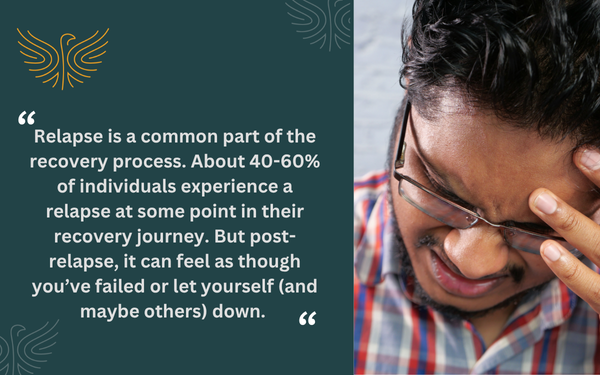Relapse is a common part of the recovery process. About 40-60% of individuals experience a relapse at some point in their recovery journey. But post-relapse, it can feel as though you’ve failed or let yourself (and maybe others) down. You might question your progress. You might feel unsure about the next step.
So, what happens if you relapse after rehab? What should you do? Is it normal? Below, we take a closer look.

_______________________________________________________
Is It Normal to Relapse After Rehab?
Yes, as mentioned above, it is very common and normal to relapse after rehab1.
Because addiction affects both the brain and behavior, maintaining recovery requires ongoing effort, support, and adaptation. Setbacks like relapse do not mean treatment has failed or that a person cannot recover. Instead, they are a signal that your recovery plan may need to be adjusted to better meet your current needs.
At the end of the day, recovery is a lifelong journey. Each person’s path will look different. And it’s normal for them to be paved with ups and downs. What matters the most is your ability to recommit to your sobriety and strive to improve, even in the face of setbacks.
_______________________________________________________
Do I Lose All My Progress If I Relapse?
Despite what many think otherwise, a relapse doesn’t mean you’ve lost all your progress. A relapse does not erase the skills, insights, or healing you’ve already gained through treatment and personal growth2.
It’s important to remember that progress in recovery is cumulative. This means that one relapse won’t undo what you’ve learned up to this point. If anything, a relapse highlights areas that require further work or growth. Instead of viewing relapse as failure, it can be reframed as a learning opportunity. Each challenge offers new insights into personal triggers, unmet needs, or areas where more support is necessary.
What Actually Happens When You Relapse?
Relapse usually looks different for everyone. And it’s worth noting that it doesn’t mean you’ve returned to your previous level of use. Sometimes, it may involve a single use or a very brief period of returning to old behaviors and habits. At other times, it may be a more prolonged duration. Either way, if you’ve recognized there’s a problem, this is a good step in the right direction.
While relapses often trigger strong feelings of shame, guilt, and discouragement, what you do next is the most important part.
_______________________________________________________
Steps To Take After Relapse
Taking immediate action is imperative to getting back on track. Initially, it’s important to reach out for support, such as a trusted friend, therapist, or sponsor. Avoid isolating yourself, as this can actually make the situation worse and lead to further relapse or a longer relapse.
Next, take time to assess what contributed to the relapse. Reflect on the triggers, stressors, or patterns that may have led to using again. A counselor or therapist can help guide this process.
From there, it’s important to adjust your recovery plan as needed. This might involve developing new coping mechanisms, identifying additional supports, or creating strategies to handle new or unforeseen challenges. Being proactive about updating your recovery approach helps build resilience and strengthens your ability to maintain long-term sobriety. For many, this may also mean returning to rehab, even if it’s for a brief period. Ultimately, rehab can offer a valuable opportunity to reinforce recovery skills and address underlying issues.
_______________________________________________________
Preventing Future Relapse
Preventing future relapses means re-engaging in your recovery and building a life that supports your well-being. It doesn’t mean you might not slip up again; always lean toward giving yourself grace and compassion throughout the process.
When it comes down to it, recovery is ongoing, and continuing with aftercare programs, therapy, and support groups can help keep you connected and grounded. Therapy and counseling can help you process life’s ups and downs, explore the reasons behind your substance use, and strengthen your coping tools.
At the same time, building a strong support network is of the utmost importance3. Surround yourself with people who encourage your recovery and understand what you’re going through. It also helps to create a relapse prevention plan—a simple guide you can lean on when challenges arise or triggers present themselves. This might include simply knowing your triggers, practicing healthy ways to cope, and/or having a plan for who to call if you need extra support.
Are you currently struggling? If you need a helping hand, our team at Freedom Recovery Centers (FRC) is here to help. We’ll be there to help you get back on track when you need it. Take that first step today and call us at 804-635-3746 or fill out our online form. Re-commit to your sobriety and pave your way toward a life you love.
.svg)






.svg)

.svg)



.svg)
